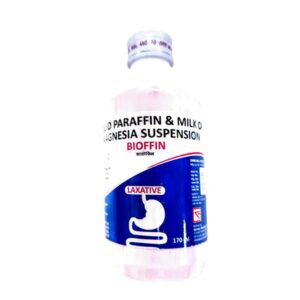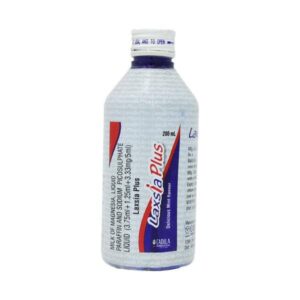LIQUID PARAFFIN + MILK OF MAGNESIA
Liquid Paraffin: Drug: Liquid Paraffin
Liquid Paraffin, also known as mineral oil, is a purified form of petroleum that is used as a medical treatment for various conditions. It is commonly used as a laxative and as a lubricant for the gastrointestinal tract.
Mechanism of Action:
Liquid Paraffin works as a laxative by lubricating the intestines and softening the stool, which helps ease the passage of feces. It forms a slippery film along the walls of the intestines, making it easier for stool to move through the digestive system. It also helps to retain moisture in the stool, preventing dry and hard stools.
Use:
Liquid Paraffin is primarily used to relieve constipation and promote regular bowel movements. It is often recommended for individuals who have difficulty passing stools or experience infrequent bowel movements. It can also be used to prevent straining during bowel movements in certain medical conditions such as hemorrhoids or anal fissures.
Dose:
The recommended dose of Liquid Paraffin may vary depending on the individual and the severity of the condition. It is usually taken orally, either alone or mixed with food or drink. The typical adult dose for constipation relief is 15-30 ml per day, divided into two or three doses. However, it is important to follow the instructions provided by the healthcare provider or the instructions on the product label.
Side Effects:
While Liquid Paraffin is generally considered safe for short-term use, it may cause some side effects. Common side effects include:
1. Diarrhea: Liquid Paraffin can cause loose stools or diarrhea, especially if taken in excessive amounts.
2. Abdominal discomfort: Some individuals may experience bloating, stomach cramps, or discomfort after taking Liquid Paraffin.
3. Malabsorption of fat-soluble vitamins: Long-term use of Liquid Paraffin can lead to the decreased absorption of fat-soluble vitamins (A, D, E, K). This can result in vitamin deficiencies if not appropriately managed.
4. Aspiration pneumonia: If Liquid Paraffin is accidentally inhaled into the lungs, it can cause a type of pneumonia called aspiration pneumonia. This risk is higher in individuals with swallowing difficulties or who have a reduced gag reflex.
It is important to consult a healthcare professional before using Liquid Paraffin, especially if you have any pre-existing medical conditions or are taking other medications. They will be able to provide specific dosage instructions and advice tailored to your needs.
Milk Of Magnesia: Milk of Magnesia, also known by its generic name magnesium hydroxide, is a medication used primarily for the treatment of constipation. It is classified as an osmotic laxative and antacid.
The mechanism of action of Milk of Magnesia involves drawing water into the intestines, which softens the stool and increases the frequency of bowel movements. This helps to relieve constipation and promote regularity. It also has antacid properties that can neutralize excess stomach acid, providing relief from symptoms of heartburn, indigestion, and sour stomach.
The usual recommended dose of Milk of Magnesia for adults and children over 12 years old is 5 to 30 ml taken orally, usually after meals or at bedtime. For children between 6 to 12 years old, the usual dose is 2.5 to 15 ml, and for children below 6 years old, the dosage should be determined by a healthcare professional.
While Milk of Magnesia is generally safe for most people, some common side effects may include diarrhea, nausea, vomiting, abdominal cramps, and dehydration. It is important to drink plenty of fluids while taking Milk of Magnesia to stay hydrated. If any severe side effects such as rectal bleeding, severe stomach pain, or allergic reactions occur, it is essential to seek immediate medical attention.
It is important to note that Milk of Magnesia should not be used for a prolonged period or in high doses without medical supervision, as it may disrupt the electrolyte balance in the body or cause an excessive loss of fluids. It should also be avoided by individuals with kidney problems or those on a low-magnesium diet. As with any medication, it is always recommended to consult with a healthcare professional before starting Milk of Magnesia.



